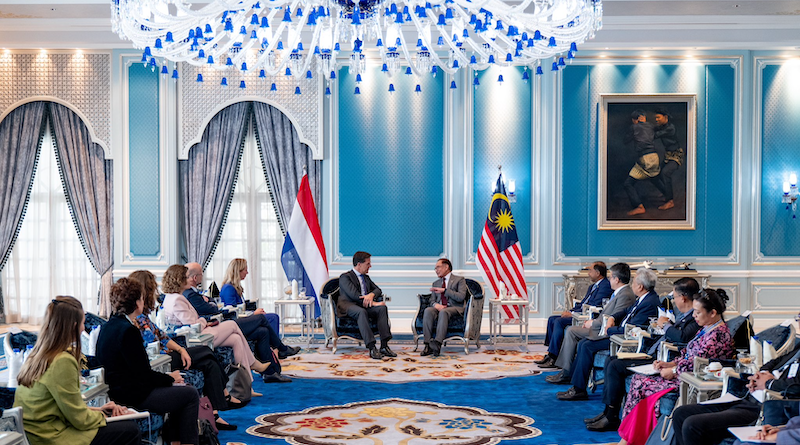The Netherlands’ New Indo-Pacific Push – Analysis
The visit of Prime Minister of the Netherlands, Mark Rutte to Malaysia signals a new strategic affiliation in capitalising on the shifting weight of economic and security returns in the region and in Europe, cementing the best future calculations to both parties. While economic, trade, business and supply chain domains will be the primary focus, the rapid changes in geostrategic and security calculations create new frontiers for deeper understanding and formation of tenets of trust and confidence in creating extended cooperation both in values-based framework and hard asset capacity of defence and total security.
Malaysia’s upcoming chairmanship of ASEAN in 2025 provides a new opening for the acceleration of a deeper economic and new energy friendly framework that will create resilient and long term lifelines and complementing factors for the EU and beyond. This translates beyond the economic realm alone, as the critical need to reassure supply chain and energy and food security will require the protection of maritime and trade domain security which will be based on the assurance of the rules based order.
The region is the next geostrategic hotspot for The Hague especially in the cornerstone of economic security and in expanding its values and security overview and perspectives which will contribute towards moulding a region that is in line with the existing status quo that has been espoused by the EU and the West as a whole.
Malaysia is seen as the gateway in the region in ensuring this tool of assurance, and the visit reflects the growing dependence on food and energy security as one of the main pillars of concerns and urgency.
New areas of cooperation that are in line with future capacities include green and new energy and cooperation in climate responsibilities and climate impact mitigation efforts.
Traditional sectors of cooperation in trade, investment, and educational and human capital development now require the efforts and influence of other domains especially in technology and food security. This leads to the areas of cooperation in agriculture and commodities, especially on palm oil that has remained a contentious issue with the EU.
The Netherlands was the largest palm oil importer among the EU countries for last year, reflecting the need to ensure continuation of assurances. It looks to palm oil as another factor in ensuring its food security sphere, and for this, new strategic adjustments and assurances are needed to both align with the EU structures and to ensure an increased stream of supply from Malaysia. For Malaysia, it needs the Netherlands as the vital partner in projecting a new perspective on the renewed and consistent efforts taken to ensure sustainability and climate friendly practices of the palm oil industry, and to portray the right messaging intent in correcting the conventional views in the EU and the larger European market.
Trade ties remain robust, where The Hague was Malaysia’s 14th largest trading partner globally and the second largest among (EU) Member States in 2022, with total trade amounting to USD10.93 billion which was an increase of 33.4 percent, as compared to USD8.68 billion in the preceding year.
Prime Minister Mark Rutte is touted as the early favourite to helm the position of NATO chief in which he has signalled his interests in the job. He has gained rising support, and is predicted to gain support from critical Eastern members who remain concerned on the issue of Ukraine and Russian ambition.
Some have argued that Rutte remains the best candidate based on his experience and coming from a country where it is traditionally seen as a transmission chain between the perspectives and lenses of Anglo Saxon and Continental Europe, which remains the missing link and compromise among other NATO members.
Getting the top NATO job will require support from others, especially Washington in which Rutte will need to increase his visibility and presence in the sphere of the top lawmakers in the Capitol.
Rutte has the record of guiding NATO through the ongoing Ukraine crisis, and has dealt quite extensively with Trump during the previous administration. Rutte also has been helming the Netherlands for 13 years, which is now the fifth largest economy in the EU.
Since the MH17 incident, Rutte has also been shifting gradually into scepticism of Russia, and has bolstered his credentials of greater transatlantic ties by aligning with Biden’s goals of the tech embargo on China, by going along with the export ban on advanced semiconductor-making equipment despite raising the ire of Dutch microchip giant ASML.
While the Netherlands has been one of the least contributors to NATO defence budget, with less than 2% of its GDP, it has pledged to spend 2.03% for 2024.
Malaysia will need to increase its leverage and strategic returns in gaining on the growing influence and power capacity of The Hague in new power factors. The chips and cards on future mutually cohesive returns have to be wisely managed, in getting the assured security and deterrence bulwark with increased defence and security assurance by the Europeans in the Indo Pacific and in this region. This includes the renewed interests and arguments for the expansion of NATO presence in the Indo Pacific in which Japan has taken the lead. Malaysia’s advantage of commodity resources in food security and regional maritime security remain intertwined with renewed EU interests in the region.
The Netherlands remains a vital partner in not only penetrating deeper into the strategic working arena with the EU as a whole, but in ensuring bulwark of democracy, freedom and a rules based order based on common uplifting and protection of these principles remains of primary priority for both countries in mutual future returns and assurances of geopolitical stability and capable response capacity.

